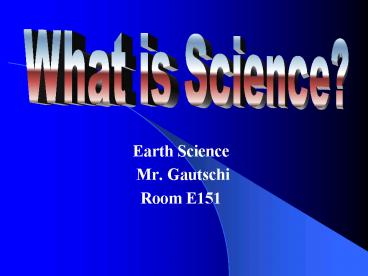Earth Science PowerPoint PPT Presentation
1 / 12
Title: Earth Science
1
What is Science?
- Earth Science
- Mr. Gautschi
- Room E151
2
Agenda
- Objectives
- Thought Question
- Group Brainstorming Activity
- Note Taking Taking Notes
- Vocabulary
- Understanding Metric Conversion
3
By the end of the Lessons you should be able to
- Explain and define the different steps of the
scientific method. - Identify and use SI units used to measure mass,
length and volume. - Convert between metric units (e.g. kg
g). - Describe the different types of variables (I/D)
- Compare and contrast qualitative and quantitative
observations - Decide whether or not a statement is a hypothesis.
4
Thought Questions (read em, write em, do em)
- Define the following words using your own terms
- Science
- Technology
- Why do students take notes?
5
Cornell Notes
- Note taking is an art form. Notes should allow
the student to find and acquire information
quickly and easily. - Cornell notes not only help to keep information
organized but also allow students to reflect on
the information being presented to them.
6
Vocabulary
- Scientific Method-the process that scientists use
to solve problems and answer questions the
following are the steps of the scientific method- - Identify a Problem/Ask a Question- after you do
this you want to gather as much info as possible
to help create an informed hypothesis - Form an Educated Hypothesis (must be testable)
- Design an Experiment (tests the hypothesis)
- Make Observations during experimentation
- Analyze/Display Data (tables, calculations
graphs) - Come to a Conclusion (Reject or accept
hypothesis) - Communicate Your Results (put info into your
lab-book including colored diagrams)
7
Vocabulary (Continued)
- Hypothesis- A prediction that can be tested
- Control- The standard used to compare with the
outcome of a test the base line - Variable- The factor(s) that is/are tested in an
experiment the part of the experiment that
changes - Theory- An explanation of things or events based
on many observations (explains Why things
occur) - Law- A reliable description of nature based on
many observations and vast amounts of scientific
data (explains How things occur).
8
Observation Application
- Quantitative- a determined or estimated amount
involving the measurement of an object - The 500 kg lion has 6 cm long claws at the end of
each of its 18 toes.
- Qualitative- an intelligible description or
feature by which a thing may be identified - The cute, fuzzy, tan colored lion has sharp teeth
and a long tail.
Application- new use to which results are put or
new techniques developed
9
Two Types of Variables
- Dependent Variables- affected by the change in
the independent variable. The new value of the
dependent variable is caused by and depends on
the value of the independent variable.
- Independent Variables- a variable that is
manipulated by the experimenter
Example Does the height a ball is dropped change
the number of bounces it will make? The height is
the Independent Variable and the number of
bounces is the Dependent Variable
10
Vocabulary (Continued)
- SI-The International System of Units
- also known as the metric system.
- Mass grams
- Length meter
- Volume Litre
- Temperature Celsius or Kelvin
- The metric system is used because it is easy to
convert data sets/units
11
The metric system is a base ten system
12
Checking for Understanding
- Which of the following are examples of a
hypothesis? - Einstein was the smartest scientist of his time.
- All dogs are blue.
- Ice melts faster when salt is poured on it.
- Which SI Unit would you use to measure the
following? - Your weight
- How far it is from your house to school
- The temperature outside
- How much water there is in a cup

